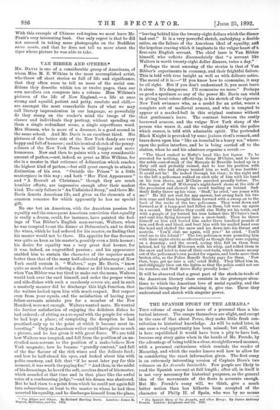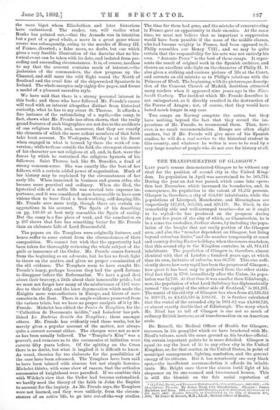THE SPANISH STORY OF THE ARMADA.*
Tars volume of essays has more of a personal than a his- torical interest. The essays themselves are slight, and except in the case of that about Perez, they make little fresh con- tribution to historical knowledge. As will be noted later, in one case a real opportunity has been missed; but still, what is here republished it would have been a pity to have lost, because any story gains when in the hands of Mr. Fronde, by the advantage of being told in a clear, straightforward manner, with a personal enthusiasm which reminds the reader of Macaulay, and which the reader knows well how to allow for in considering the exact information given. The first essay is an extremely interesting version of Captain Duro's two volumes on La Armada Invincible. Few people are likely to read the Spanish account at full length ; after all, in itself it is not very necessary for historical purposes, as the general idea of the movements of the fleets is accurate enough. But Mr. Fronde's essay will, we think, give a much better notion than has hitherto been accepted of the character of Philip II. of Spain, who was by no means
• The Spanish Story of the Armada, and other Esaayi. By James Anthony Fronde. London : Longman and Co. 1892.
the mere bigot whom Elizabethan and later historians have caricatured. The reader, too, will realise what Ranke has pointed out,—that the Armada was in intention but a part of a great whole, a move in a great game whose course was subsequently, owing to the murder of Henry III. of France, diverted ; a false move, no doubt, but one which gives a very forcible illustration of the doctrine that no his- torical event can be taken with its date, and isolated from pre- ceding and succeeding circumstances. It is, of course, needless to say that the account contains much of interest,—the jealousies of the commanders, the slow progress up the Channel, and still more the wild flight round the North of Scotland and the cruel fate of the shipwrecked Spaniards in Ireland. The whole occupies only eighty-five pages, and forms a model of a pleasant narrative style.
We have said that there is a strong personal interest in this book; and those who have followed Mr. Froude's career will read with an interest altogether distinct from historical curiosity, what he has to say about St. Theresa. It affords a fine instance of the rationalising of a myth,—the essay, in fact, shows what Mr. Fronde has often shown, that the really grand features of such biographies are not due to the accidents of one religious faith, and, moreover, that they are exactly the elements of which the more ardent members of that faith take least account. To Wesleyans, Wesley is at his finest when engaged in what is termed by them the work of con- version; while to those outside the fold, the strongest elements of his character are not religious at all, and, in fact, were the forces by which he restrained the religions hysteria of his followers. Saint Theresa had, like St. Benedict, a fund of strong common-sense. She was exactly like the best of her fellows, with a certain added power of organisation. Much of her history may be explained by the circumstances of her early life. When immersed in business and grown older, she hecame more practical and ordinary. When she died, the hysterical side of a noble life was erected into supreme im- portance, and it was considered more honourable to have seen visions than to have lived a hard-working, self-denying life. Mr. Froude sees more truly, though there are certain ex- aggerations in his account. The Spain of his describing on pp. 149-50 at best only resembles the Spain of reality. But the essay is a fine piece of work, and the conclusion on p. 207 shows that fate has something better for Mr. Froude than an elaborate Life of Lord Beaconsfield.
The papers on the Templars were originally lectures, and hence suffer to some extent from the circumstances of their composition. We cannot but wish that the opportunity had been taken for thoroughly reviewing the whole subject of the guilt or innocence of the Order. Mr. Fronde comes forward from the beginning as an advocate, but he has no fresh light to throw on the matter, and gives no proper examination of the old evidence. The Templars seem to have caught Mr. Froude's fancy, perhaps because they had the gooll fortune to disappear before the Reformation. We have a good deal about their bravery, a little about their honourable pride ; but we must not forget how many of the misfortunes of 1187 were -due to their folly, and the later degeneration which made the Knights mere rent-collectors in Europe, and hirers of mer- cenaries in the East. There is ample evidence preserved from the various trials, but we have no proper analysis of it by Mr. Fronde. Michelet has edited the Procs de Templiers, for the " Collection de Documents inedits," and Loiseleur has pub- lished La Doctrine SecrCte des Templiers ; these amongst -others. Mr. Fronde has evidently read these works, but he merely gives a popular account of the matter, not always quite a correct account either. The charges were not so new as has been usually believed. The "Templar's Kiss" was a proverb, and rumours as to the ceremonies at initiation were current fifty years before. Of the spitting on the Cross there is no doubt, but what it implied it is difficult to know. As usual, theories far too elaborate for the possibilities of the case have been advanced. The Templars have been said to have been tainted with obscure but not simple heresies. Michelet thinks, with some show of reason, that the orthodox ceremonies of knighthood were parodied. If we combine this with Wilcke's view that the Order had become rationalised, we hardly need the theory of the faith in John the Baptist to account for the impiety. As Mr. Froude says, the Templars were not learned, and they were unlikely, from the circum- stances of an active life, to go into out-of-the-way studies.
The time for them had gone, and the mistake of concentrating in France gave an opportunity to their enemies. At the saite time, we must not believe that so important a suppression would have been possible if the mass of the middle classes, who had become weighty in France, had been opposed to,it. Philip resembles our Henry VIII., and we may be quite certain that the responsibility for his acts was not entirely his own. "Antonio Perez" is the best of these essays. It repre- sents the result of original work in the Spanish archives, and throws an excellent side-light on the character of Philip II. It also gives a striking and curious picture of life at the Court, and corrects an old mistake as to Philip's relations with the Princess of Eboli. The beginning, with its picturesque descrip- tion of the Convent Church of Madrid, doubtless attracted many readers when it appeared nine years ago in the Nine- teenth Century. The incident which Mr. Fronde describes is not unimportant, as it directly resulted in the destruction of the Fueros of Aragon ; not, of course, that they would have lasted much longer in any case.
Two essays on Norway complete the series, but they have nothing, beyond the fact that they record the im- pressions of Mr. Froude, to recommend them. That, how- ever, is no small recommendation. Essays are often slight matters, but if Mr. Froude will give more of his Spanish studies, he will do a real service to the historical student in this country, and whatever he writes is sure to be read by a very large number of people who do not care for history at all.



































 Previous page
Previous page